#it was so fun and easy to understand.... esp the early movements...
Explore tagged Tumblr posts
Text
its such a hard life i lead i just want to watch aim for the ace with jelly but instead i have to study FOR 20TH CENTURY ART!!!!! IDGAF ABOUT 20TH CENTURY!!!!! TAKE ME BACK TO 19TH!!!!!!!!
#19th century art was the best art history class ive ever taken#it was so fun and easy to understand.... esp the early movements...#i like it because everything was laid out so plainly from baroque-romanticism#then we get into late 19th century and besides haussmannization ... i dont really care ......#impressionism + neo/post impressionism looks very pretty but im bad at analyzing it#like i can identify the movements when i see a piece but its still hard for meeee#<- guy who does not gaf about landscapes#i love portraits portraits are my bffsies#cubism is like. hard for me to think of as cool. because i hate picasso so much#i like girl with mandolin though i think that is a beautiful piece#and there were very creative ideas and executions!#its just sullied by the fact that i hate everyone involved#<- my old/favorite professor was really really about separating art from the artist#like she did NOT care about what the artists intent was the only thing she cared about was how the audience/herself viewed it#which is an interesting viewpoint that i dont necessarily agree with#mostly because i would hate for people to see my art and just completely ignore what *i* as the artist meant for it#anyway all this to say im about to mega super flop my midterm on wednesday and i want to explode#i dont understand the history behind cubism very well. like i can get that picasso was really into abstracting and flattening#and that it inspired braque#hmmm much to think about#jonesytag
2 notes
·
View notes
Text
Episode 15 Review: Diegesis in a Strange Paradise
{ YouTube: 1 | 2 }
{ Synopses: Debby Graham | Bryan Gruszka }
{ Screencaps }
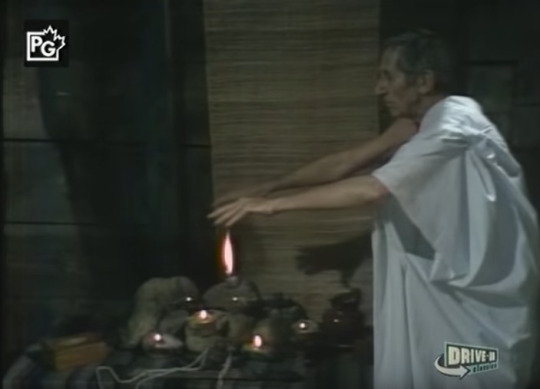
Introducing Vangie’s father, the Conjure Man.
We open to the sound of some funky drums as a mysterious old man in a toga-like garment conducts a religious ritual, swaying his stiff limbs as strange lamps burn on an altar in the background. He lays down exhausted on a straw mat as Vangie enters.
“Good,“ says the old man, “you’re just in time.” In the background, the drums continue beating, which makes me wonder: can he hear the drums and, if so, where is the music coming from? If you’ve read my reviews of previous episodes, you’ll know that I like to analyze which elements on this show are diegetic and which are not--which, most of the time, is surprisingly hard to determine.
For those who don’t already know or who want a more in-depth explanation than I’ve previously given, diegesis is a mode of storytelling that shows the actions of a story from the characters’ point of view (the diegetic or intradiegetic level), as opposed to that of an outside narrator (the extradiegetic level). The narrator writes about what the character sees, hears, thinks, and feels, without stylizing it or filtering it through an outside perspective. In literature, this kind of narrative is easy to spot and usually takes either a first-person or third-person limited perspective--or, more rarely, a second-person perspective. A third-person omniscient narrative can be purely diegetic, but only if the narrator doesn’t add their personal opinions or interpretations of the characters to the story.
In theater, film, and TV, determining what elements of a narrative are diegetic is more difficult, because the dramatic arts all rely on extradiegetic storytelling to some degree. The writer(s) and director(s) take on the role of narrator and have to communicate the characters’ experience to the audience in a way that they will understand, often relying on theatrical conventions that aren’t realistic but help them communicate the characters’ thoughts and feelings better.* One example relevant to soap operas like this one is backacting**, which “is to stage a scene so both actors are facing the camera...The idea is that it has the benefit of getting both character’s [sic] faces full on in the shot, so you get the full impact of their acting and/or emoting.” Obviously, most people don’t turn away from the people they’re talking to in real life, and most soap characters probably wouldn’t, either, if they were real people. This makes backacting non-diegetic.
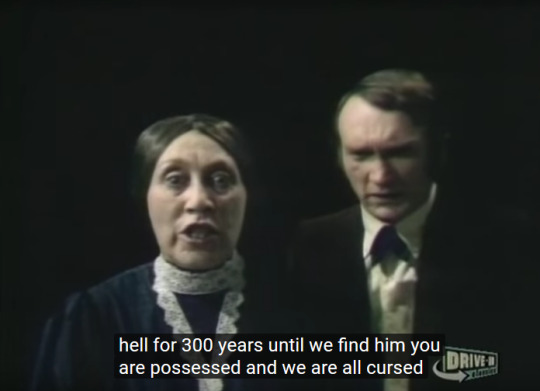
My favorite example of backacting on this show, from Episode 5.
So far under my diegesis tag, I’ve examined Jacques Eloi des Mondes’ vanishing portrait and his ring to determine whether or not those were diegetic. The portrait vanishing is diegetic in the Paperback Library novels based on the show, and we know this because multiple characters reference it. Take, for example, this scene from the first book:
They started to leave the room, but Diana stopped short to stare at the frame where the portrait of Jacques Eloi des Mondes was plainly revealed when she entered the hall. "That's strange," she said, frowning. "I'd have sworn there was a portrait in that frame." A hand took her elbow gently and words were spoken so close to her ear that warm breath touched her earlobe. "But no. It was taken out to be cleaned and will be restored shortly. How attractive you are when you look perplexed, my dear." ***
On the show, however, it’s non-diegetic. No one ever mentions the portrait disappearing and as early as Episode 6, the crew stop removing it when Jacques possesses Jean Paul. Less than two weeks later, his handsome face stays smirking inside the frame whether or not his spirit is inside Jean Paul’s body. When he possesses him, the camera still cuts to the shot of the blank portrait, but the portrait itself is still visible on the set and to the characters. In Episode 12 where Jacques controls Jean Paul for the entire episode, Holly has a short scene where she discusses how much he resembles his descendant, and the portrait is visible--and that’s just one example of many.
The ring, in contrast, is diegetic, which we know because Elizabeth mentions it in Episode 13. It later appears in Episode 68 where Raxl tries to sacrifice it to the Great Serpent. But it also appears for a short time on another character’s hand in Episode 59 before disappearing again, and I’m not sure if that part was intended to be diegetic or merely symbolic of Jacques’ alliance with said character. (I think that, in that instance, it’s supposed to be the latter.)
And now we return to the Conjure Man and the unseen drums in the background of his introduction scene. We know from Episode 12 that Raxl and Quito have tried contacting him through voodoo rituals, which involved (among other things) Quito beating a drum. While I doubt that a hypothetical ordinary human would hear the drums if they were to spy on him, it is possible that he can hear them (either literally or telepathically) thanks to his supernatural powers. If this is true, then the music is diegetic whether or not any other characters could hear it, because at least one character does.
Alternatively, the Conjure Man could have the power to make drums beat on his own, or create music out of thin air like the ghosts in this fun Dark Shadows episode. Kind of a stretch, but it is a fantasy show, and I’m willing to suspend my disbelief in any fantasy elements as long as I think they’re cool. I don’t understand why some other fantasy fans need a pseudo-scientific explanation for fantastic elements in stories; just tell me “this man, who is over 300 years old, has the power to summon drum noises at will” and I’ll gladly accept it, no questions asked. It’s a fantasy story; we don’t need to know the pseudo-physics involved.
Or maybe the music is just regular, incidental, non-diegetic music and I’m just overanalyzing again (which is probably the truth). Whatever. I’d rather spend my free time writing about Strange Paradise than have a social life. ;)

Vangie and the Conjure Man.
Anyway, the Conjure Man tells Vangie that he foresees that he will die soon and therefore she, his sole heir, must become the Conjure Woman. Vangie doesn’t want to, saying “I don’t believe.” However, her father insists that she is best because she “know[s] this modern world” and is “trained for the future when man will wake up to the network of his own mysticism.” (A possible reference to the idea of the Age of Aquarius or the New Age movement in general?) Vangie replies that, although she believes in telepathy and ESP, she does not believe in witchcraft because “its roots are in the past.”
“Where could you find roots, but in the past?” asks the Conjure Man, chewing the scenery. “How can a tree grow without roots? How can you deny your own destiny? Yours is a gift of giving, Vangie. Don’t deny that.”
“I don’t want it!”
“You can’t escape it!” He tries to stand up, but can’t, and tells Vangie the messages or “truths” that he has received. “On Maljardin, the Devil is loose again.” The drums intensify. “Your minister will be sent for. The forces of evil have drawn a battle line between God and the Devil!”

I like this screencap. Taken out of context, it looks like Alison is doing a Raxl impression.
On the cursed isle of Maljardin, Jean Paul and Alison meet in the Great Hall for some recap. Alison repeats her intention to stay, but insists that Jean Paul promise her some things. This pisses off THE DEVIL JACQUES ELOI DES MONDES, who decides to take over and listen to the conditions instead, making Jean Paul look like a fool in the process:
Condition #1: Jean Paul informs Erica’s and her father of Erica’s death.
Jacques’ response:
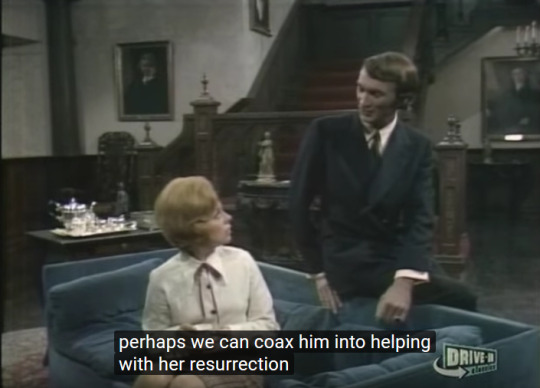
Trolling Alison by suggesting her father might help with his insane cryonics scheme.
Alison objects, saying that her father knows that cryonics is a pseudoscience. “There’s always a beginning,” Jacques replies, mocking her. “Aren’t you proud that your sister is one of its pioneers?”
This pisses her off, understandably. “I was a fool to stay here,” she remarks. But he just keeps talking, first about how no word of the cryonics experiment must leak out (again) and then about transplants (also again). They discuss a brain transplant experiment involving bird embryos by a Yugoslavian scientist named Pavlovic, which actually happened, but with a low survival rate. Clearly Ian Martin did some research on organ transplants, and one has to wonder if he knew of the failures and deliberately used them to foreshadow problems with Erica’s resurrection.
Condition #2: That he bring a minister to Maljardin to conduct a funeral service for Erica.
Jacques’ response: More denial that Erica is dead, plus this argument:
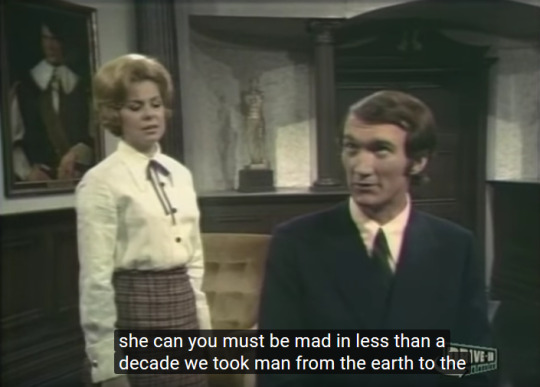
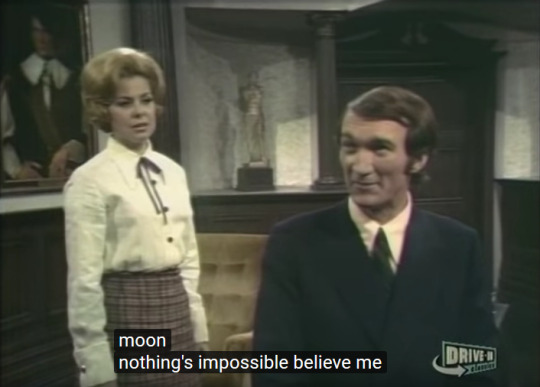
Insane troll logic: “If a man landed on the moon, that means we have achieved the impossible, which in turn means that nothing is impossible. If nothing is impossible, then Erica can come back to life.”
Alison accuses him of denying God, to which he responds that “He and I aren’t exactly on speaking terms.” (Gotta love Jacques dropping hints about his identity.) Cut back to the Conjure Man:
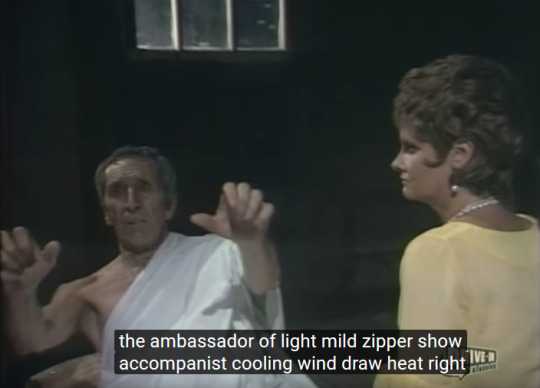
Any idea what any of this means?
The Conjure Man is busy serving Vangie a nice nutritious plate of word salad as he slowly passes over to the spirit world and YouTube’s automatic captions gleefully obscure the meaning of his words even more. The actual line doesn’t make much more sense than this, speaking of a “conqueror of mist” and other mystical-sounding stuff that is most likely nonsense. And he doesn’t deliver it well, because...well...he’s just not a very good actor.
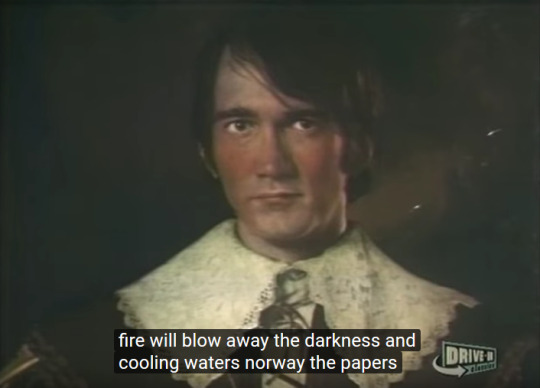
Jacques: “We are not amused. No...wait...” *snickers* “...Actually, we are.” (Note: He doesn’t actually say this, but he should have.)
Jean Paul recovers and promises to bring Matt to the island, while the Conjure Man continues giving Vangie instructions. He tells her to bring the Knight of Pentacles--which Vangie identifies with Dan Forrest--to Maljardin. I need to remember to write a post analyzing all the Tarot symbolism used sometime in the near future, which I keep putting off doing, but I will say that the description of the card at the randomly-selected Tarot website I linked to does indeed sound like a description of Dan.
At the French Leave Café--otherwise completely deserted save for Quito and the bartender--Jean Paul meets up with Matt. He orders a gin and tonic, which suggests that he was already a heavy drinker before Jacques started quaffing brandy all the time while in his body. (Speaking of which, why do the characters on this show and Dark Shadows just leave decanters of brandy sitting out where anyone can slip poison, drugs, or magical potions in them? I can understand why Roger Collins on DS does it because he doesn’t have a brain, but Jean Paul allegedly has an IQ of 187, so he has no excuse.) During their otherwise rather dull conversation, Jean Paul explains that he retreated to Maljardin six months earlier because he had been stalked by the news media his entire life and wanted some privacy.
He asks Matt to come to Maljardin, which he assumes has to do with Holly and probably gets a little too excited (if you know what I mean) before Jean Paul disappoints him by refusing to tell until he promises to keep the real reason a secret. But Matt insists on knowing beforehand and is shocked when Jean Paul reveals that he wants him to hold a funeral for Erica “until the day she rises again and returns to me.” The Reverend decides to humor him, most likely because sailing to the island means seeing Holly again, and he leaves to pack.
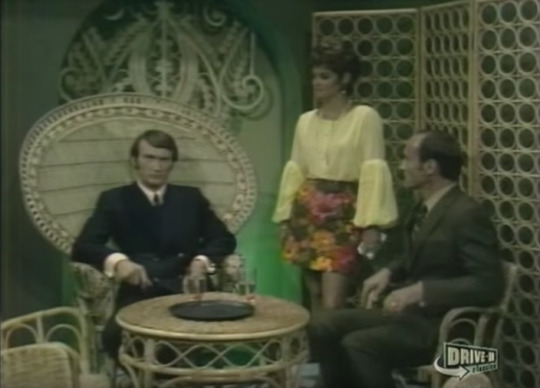
Jean Paul is reminded once again that Jacques is slowly ruining his life. He may sit on the big, fancy wicker throne now, but soon enough, the handsome devil is bound to kick the throne out from under him.
After he’s gone, Vangie shows up and so does Dan, which pisses off Jean Paul. Dan confronts his boss about the signature that he left on those business documents back in Episode 4, and Jean Paul lies and claims that he signed Jacques’ name because he “didn’t like the deal.” Dan expresses his worries about both Alison (his fiancée, in case you have forgotten) and the warnings that Vangie gave him about Jacques’ return, which I think is when Jean Paul must realize that Jacques did something with the letter that Alison wrote to Dan that made Vangie concerned (although I doubt he knows what).
We cut to the Conjure Man chanting a spell about a “mild zephyr [that] shall conquer the mist” and a “cooling breeze.” But the spell is not effective, because look who just arrived at the party:

Jacques: “You’ve overstepped yourself, Dan. Go home; you’re not needed here.” *sips gin and tonic with affectedly bored expression*
Dan demands information about what is happening to Alison. Jacques refuses, saying, “That’s none of your business.”
"I am your business!” Dan shouts. “I thought you were mine."
"You presumed wrong!"
"Then let us end this business relationship.” (I see what you did there, Mr. Martin.) “What about Alison?"
“Alison is also no longer any of your business, either.”
“What do you mean?”
Jacques stands up, as though trying to intimidate him. “Get out of my life. And hers.” And he turns and begins to walk out.
“Take your job,” Dan shouts, “and I’ll take Alison!” Good luck taking her back while she’s Jacques’ prisoner detained guest.
“Don’t be a fool, Dan! You’ve worn out your welcome on Maljardin.” I didn’t know you could wear out your welcome before you even arrived.
“You won’t get rid of me that easily. I’m coming, too!” Quito stops him by holding stiff zombie fingers in his face.
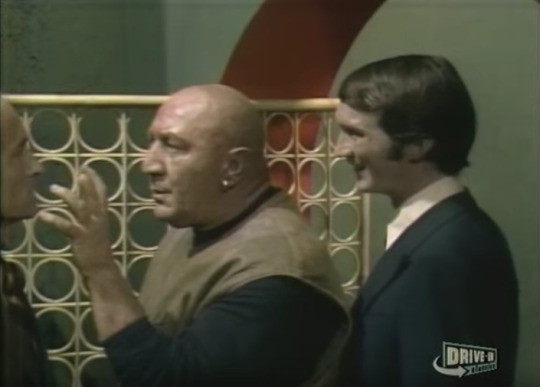
Jacques grinning smugly while Quito keeps Dan from following them.
“It could be your last trip, Dan,” Jacques sneers and leaves Alison’s estranged and far less attractive fiancé behind to rant to Vangie about how he intends to find out WTF Jean Paul is hiding “even if [he has] to blow up his lousy island.” Meanwhile, Vangie reads her Tarot cards and reveals that the King of Coins is endangering Alison’s life.
“But who is he?”
What does this have to do with diegesis, you ask? Well, not much at this point, save that, if Dan could only hear Jacques’ minor-key leitmotif playing in the background right at this moment--that is to say, if the non-diegetic music were only diegetic--he would know exactly whom Vangie means.
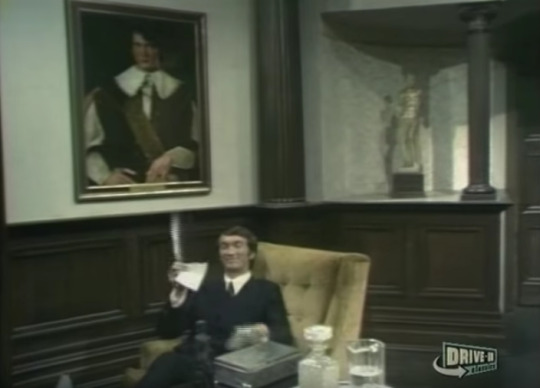
Jacques cheerfully tearing up a letter after slicing it open with the world’s biggest letter opener.
Join us again on Friday for the funniest of this week’s bad subtitles, and then again next week for my review of Episode 16.
Coming up: Reverend Matt Dawson’s arrival on Maljardin makes shock-waves and Raxl receives an important message.
Notes
* For more information about diegesis (and where I first learned of the concept), see also Joel Schumacher’s Phantom of the Opera: A Video Essay by Lindsay Ellis. The video deals in part with diegetic vs. non-diegetic songs in musicals and why this doesn’t always translate well to live-action film. The segment on diegesis starts at 5:55.
** The author of the blog post I linked to cites Danny Horn of Dark Shadows Every Day (the direct inspiration for this blog) as their source for the origin of the term “backacting.” I can’t verify that Danny invented the term, but most of the few relevant results I was able to find on Google were from his blog, so it’s likely he did. On a random note, when you search “backacting ‘soap operas,’” one of the suggested searches is “dark shadows cat,” which I absolutely adore.
*** Dorothy Daniels, Strange Paradise (New York: Paperback Library, 1969), 66.
{ <-- Previous: Episode 14 || Next: Episode 16 --> }
#strange paradise#gothic soap opera#maljardin arc#week 3#episode 15#review#analysis#ian martin#dark shadows#diegesis#insane troll logic#iq of 187#paperback library#soap opera tropes#tarot
0 notes